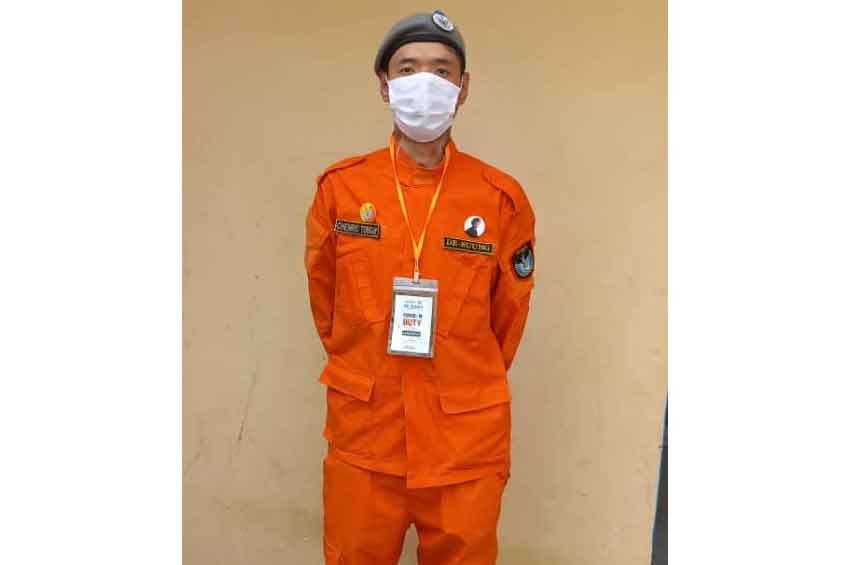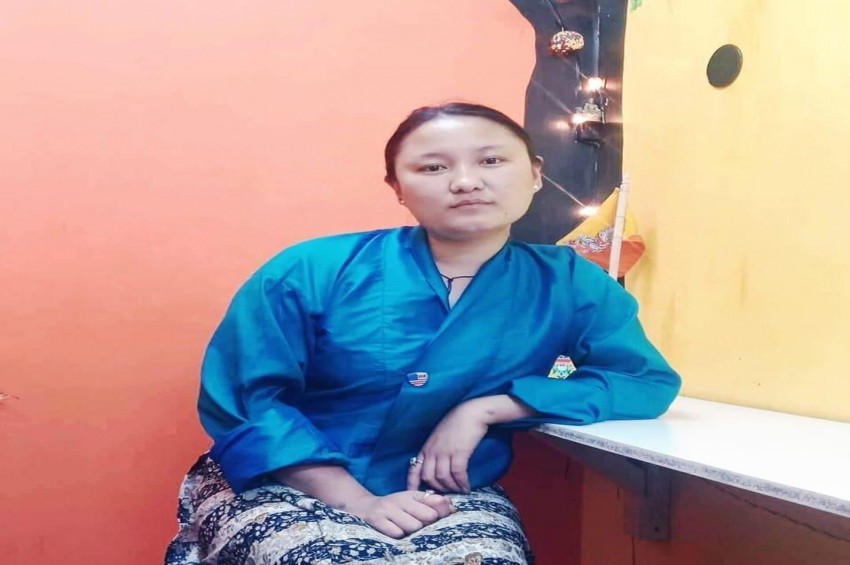There are several institutions and people who offered their unconditional service to the Nation as Bhutan battled the COVID 19 Pandemic. One and arguably the institution which played a very important role is the Desuups. And from the 34000 Desups, there are some like Chenric Tobgay, who lived in regions uninhabited for centuries, where dangerous wild animals roamed, guarding the nation’s frontiers for months.
Father of a four-year-old son, Chenric Tobgay, 25, from Zomsa gewog, Punakha, has a Bachelors in Entrepreneurship from Bangkok University, Thailand. When the Covid virus entered Bhutan and calls for solidarity were made, Chenric says he was immediately reminded of the 2003 operation to flush Indian militants, who had illegally entered Bhutan. “I was young at that time. But I can still remember watching television and His Majesty the Fourth Druk Gyalpo’s address to soldiers and militia at Deothang. I have very vivid memories of people talking about how many initially volunteered to join the militia, while thee were very few who actually joined,” Chenric says, adding that the moment need for volunteers to fight COVID 19 was made public, he decided to join the Desuup Accelerated Program. Selected in the 39th batch, Chenric left for Tendu, Samtse for the 21-day program after which doors for his dream to serve the country in a “special way” were opened.
In July 2021, Chenric says “he made a decision he is very proud of and something he will cherish throughout his life.” “I went to serve in the border with Tawang, Arunachal Pradesh,” he adds. It was not for a week or a month. Chenric was at the frontiers for 81 days, including the 3-day journey from the nearest road point to the camp.
“There were four of us, including a Royal Bhutan Police (RBP) personnel,” Chenric says, adding their first responsibility was to build the camp. “Patrolling along the border was dangerous as animals like wild boars and panthers are there and we had to should and whistle as we went around to ensure we were not attacked.”
Chenric adds that he does not want to act like “a hero,” and say all was fine. “It was difficult. There was no water source and we had to harvest rain water. Getting firewood was another problem,” he says. “Another danger was horses of highlanders from across the border who would ransack our rations. So, we had to be on guard for 24 hours, though we had shifts,” he maintains.
Like everyone taking such responsibilities at similar locations, the daily drill was monotonous. “It was patrolling, cooking, cleaning and few games of chess,” he adds. The daily diet too was the same. “We lived on potatoes, dal and rice. However, we used to relish soelras from His Majesty that came in the form of jams, condensed milk and others. These were real ‘jinlabs’ which used to boost our energy and inspire us,” he said. Chenric also recalls trying to plan tomatoes and onions. “But nothing grew,” he says.
When asked what kept him going, Chenric says it was the kupar (portrait) of His Majesty the King and addresses of His Majesty. “As a human being, I had emotional moments, especially thinking about my son. But one glance of His Majesty’s kupar would clear my mind. And our group used to talk about the hardships His Majesty would be undergoing. What we were doing was nothing.” Addresses of His Majesty, where His Majesty speaks about the importance, love and belief in the youth of Bhutan; that Bhutanese need to excel and everyone can make a difference are very close to Chenric’s heart.
When asked what messages he would want to convey to the youth of Bhutan, he says, every youth should understand that His Majesty believes in Bhutan’s youth. “There is nothing that cannot be done. Falling down once should not discourage them. And the future is bright,” he says.
In November 2021, Chenric served at Pasakha, in the South. When asked what the difference was, he replied with a smile. “It was boring in the South as there were no challenges, no fear of wild animals, and others.”
Chenric Tobgay, is interested to join the Dessup Skilling Program (DSP) for automobile repairs. “I am also interested for the SRC program. But of all, I am ready to go to the Northern Frontiers again. The Frontiers are calling,” he says.
Father of a four-year-old son, Chenric Tobgay, 25, from Zomsa gewog, Punakha, has a Bachelors in Entrepreneurship from Bangkok University, Thailand. When the Covid virus entered Bhutan and calls for solidarity were made, Chenric says he was immediately reminded of the 2003 operation to flush Indian militants, who had illegally entered Bhutan. “I was young at that time. But I can still remember watching television and His Majesty the Fourth Druk Gyalpo’s address to soldiers and militia at Deothang. I have very vivid memories of people talking about how many initially volunteered to join the militia, while thee were very few who actually joined,” Chenric says, adding that the moment need for volunteers to fight COVID 19 was made public, he decided to join the Desuup Accelerated Program. Selected in the 39th batch, Chenric left for Tendu, Samtse for the 21-day program after which doors for his dream to serve the country in a “special way” were opened.
In July 2021, Chenric says “he made a decision he is very proud of and something he will cherish throughout his life.” “I went to serve in the border with Tawang, Arunachal Pradesh,” he adds. It was not for a week or a month. Chenric was at the frontiers for 81 days, including the 3-day journey from the nearest road point to the camp.
“There were four of us, including a Royal Bhutan Police (RBP) personnel,” Chenric says, adding their first responsibility was to build the camp. “Patrolling along the border was dangerous as animals like wild boars and panthers are there and we had to should and whistle as we went around to ensure we were not attacked.”
Chenric adds that he does not want to act like “a hero,” and say all was fine. “It was difficult. There was no water source and we had to harvest rain water. Getting firewood was another problem,” he says. “Another danger was horses of highlanders from across the border who would ransack our rations. So, we had to be on guard for 24 hours, though we had shifts,” he maintains.
Like everyone taking such responsibilities at similar locations, the daily drill was monotonous. “It was patrolling, cooking, cleaning and few games of chess,” he adds. The daily diet too was the same. “We lived on potatoes, dal and rice. However, we used to relish soelras from His Majesty that came in the form of jams, condensed milk and others. These were real ‘jinlabs’ which used to boost our energy and inspire us,” he said. Chenric also recalls trying to plan tomatoes and onions. “But nothing grew,” he says.
When asked what kept him going, Chenric says it was the kupar (portrait) of His Majesty the King and addresses of His Majesty. “As a human being, I had emotional moments, especially thinking about my son. But one glance of His Majesty’s kupar would clear my mind. And our group used to talk about the hardships His Majesty would be undergoing. What we were doing was nothing.” Addresses of His Majesty, where His Majesty speaks about the importance, love and belief in the youth of Bhutan; that Bhutanese need to excel and everyone can make a difference are very close to Chenric’s heart.
When asked what messages he would want to convey to the youth of Bhutan, he says, every youth should understand that His Majesty believes in Bhutan’s youth. “There is nothing that cannot be done. Falling down once should not discourage them. And the future is bright,” he says.
In November 2021, Chenric served at Pasakha, in the South. When asked what the difference was, he replied with a smile. “It was boring in the South as there were no challenges, no fear of wild animals, and others.”
Chenric Tobgay, is interested to join the Dessup Skilling Program (DSP) for automobile repairs. “I am also interested for the SRC program. But of all, I am ready to go to the Northern Frontiers again. The Frontiers are calling,” he says.















